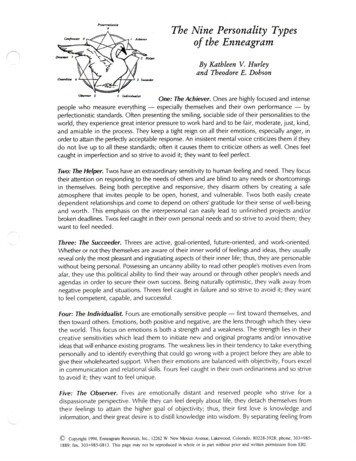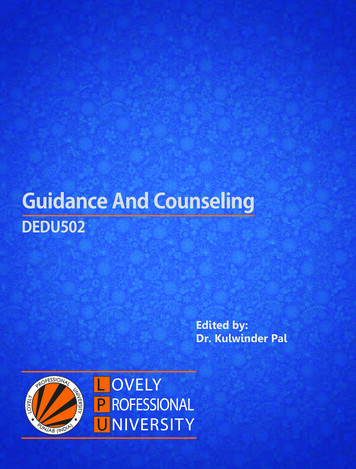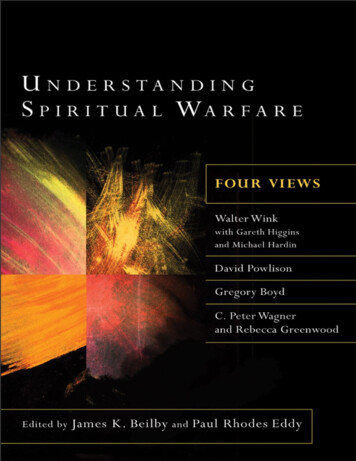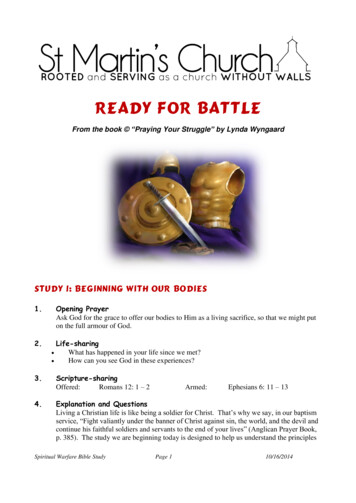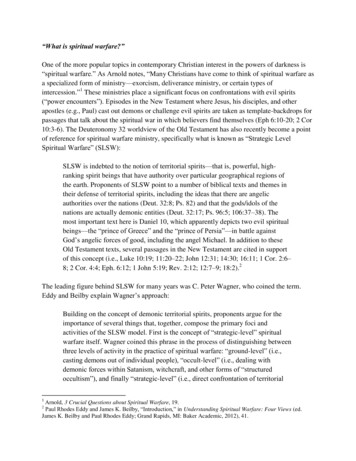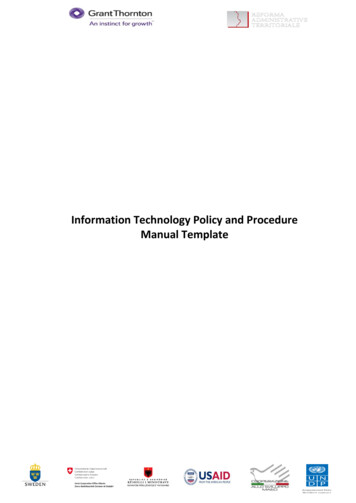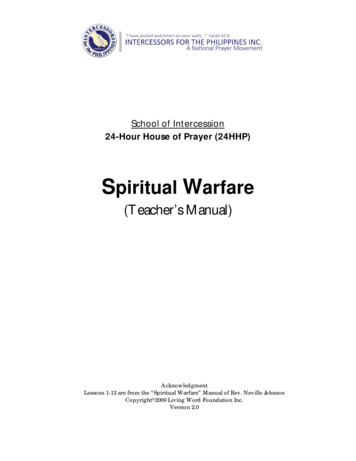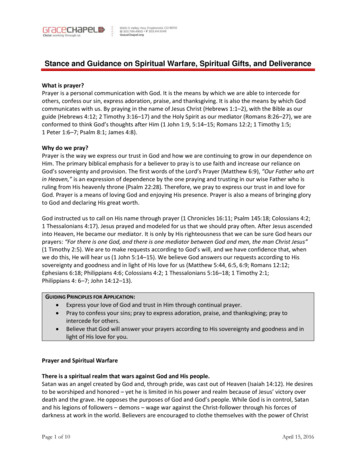
Transcription
Stance and Guidance on Spiritual Warfare, Spiritual Gifts, and DeliveranceWhat is prayer?Prayer is a personal communication with God. It is the means by which we are able to intercede forothers, confess our sin, express adoration, praise, and thanksgiving. It is also the means by which Godcommunicates with us. By praying in the name of Jesus Christ (Hebrews 1:1–2), with the Bible as ourguide (Hebrews 4:12; 2 Timothy 3:16–17) and the Holy Spirit as our mediator (Romans 8:26–27), we areconformed to think God’s thoughts after Him (1 John 1:9, 5:14–15; Romans 12:2; 1 Timothy 1:5;1 Peter 1:6–7; Psalm 8:1; James 4:8).Why do we pray?Prayer is the way we express our trust in God and how we are continuing to grow in our dependence onHim. The primary biblical emphasis for a believer to pray is to use faith and increase our reliance onGod’s sovereignty and provision. The first words of the Lord’s Prayer (Matthew 6:9), “Our Father who artin Heaven,” is an expression of dependence by the one praying and trusting in our wise Father who isruling from His heavenly throne (Psalm 22:28). Therefore, we pray to express our trust in and love forGod. Prayer is a means of loving God and enjoying His presence. Prayer is also a means of bringing gloryto God and declaring His great worth.God instructed us to call on His name through prayer (1 Chronicles 16:11; Psalm 145:18; Colossians 4:2;1 Thessalonians 4:17). Jesus prayed and modeled for us that we should pray often. After Jesus ascendedinto Heaven, He became our mediator. It is only by His righteousness that we can be sure God hears ourprayers: “For there is one God, and there is one mediator between God and men, the man Christ Jesus”(1 Timothy 2:5). We are to make requests according to God’s will, and we have confidence that, whenwe do this, He will hear us (1 John 5:14–15). We believe God answers our requests according to Hissovereignty and goodness and in light of His love for us (Matthew 5:44, 6:5, 6:9; Romans 12:12;Ephesians 6:18; Philippians 4:6; Colossians 4:2; 1 Thessalonians 5:16–18; 1 Timothy 2:1;Philippians 4: 6–7; John 14:12–13).GUIDING PRINCIPLES FOR APPLICATION: Express your love of God and trust in Him through continual prayer. Pray to confess your sins; pray to express adoration, praise, and thanksgiving; pray tointercede for others. Believe that God will answer your prayers according to His sovereignty and goodness and inlight of His love for you.Prayer and Spiritual WarfareThere is a spiritual realm that wars against God and His people.Satan was an angel created by God and, through pride, was cast out of Heaven (Isaiah 14:12). He desiresto be worshiped and honored – yet he is limited in his power and realm because of Jesus’ victory overdeath and the grave. He opposes the purposes of God and God’s people. While God is in control, Satanand his legions of followers – demons – wage war against the Christ-follower through his forces ofdarkness at work in the world. Believers are encouraged to clothe themselves with the power of ChristPage 1 of 10April 15, 2016
Stance and Guidance on Spiritual Warfare, Spiritual Gifts, and Deliverancein the full armor of God and pray in the Holy Spirit to withstand Satan’s attacks (Genesis 3:1–7;Job 1:12, 2:6; Ezekiel 28:13–15; Zechariah 3:1–2; John 8:44; 2 Corinthians 4:3–4, 2:10–11, 11:13–15;Ephesians 2:2, 6:12–18; 1 Peter 5:8; Revelation 12:10).What is our role in spiritual warfare?Christians are to wage war against sin in themselves (Romans 6) and oppose the schemes of the devil(Ephesians 6:10–18). We should never be impressed, intimidated, or bullied by Satan and his demons.Satan and the demonic spirits are, by nature, liars (John 8:44), but it is the power of Christ that bindsthem (Colossians 2:15). Once we have placed our faith in Jesus Christ and have been justified, God“rescued us from the domain of darkness, and transferred us to the Kingdom of His beloved Son”(Colossians 1:13).How do we conduct spiritual warfare?“For though we walk in the flesh, we are not waging war according to the flesh. For the weapons of ourwarfare are not of the flesh but have divine power to destroy strongholds” (2 Corinthians 10:3–4). Whenengaging in spiritual battles, we rely on God’s power, not our own. We gain spiritual power through theGospel of Jesus Christ which overcomes sin and hard hearts that oppose us (Romans 10:17; James 1:18;1 Peter 1:23), which includes demonic opposition. Our confidence rests in the fact that we are declaredrighteous because of Christ’s sacrifice for us. We are not to waver in our faith, trusting God’s promisesno matter how strongly we are attacked. Our ultimate defense is the assurance we have of oursalvation, an assurance that no spiritual force can take away. Our offensive weapon is the Word of God,not our own opinions and feelings. We pray in the power and will of the Holy Spirit, trusting that Jesus isultimately ruling over all unseen spirits (John 16:33). We stand firm against our enemy (Ephesians 6:13–14), and we resist the devil’s work (James 4:7) knowing that the Lord of hosts is our protector. “Truly Heis my rock and my salvation; He is my fortress, I will never be shaken” (Psalm 62:2).How does Satan and his powers affect the Christian?We believe that Satan and his powers are able to oppress those who have been saved by faith in JesusChrist. Through temptation and affliction, by the permission of God, Christians can experience theeffects of Satan’s power in their lives. However, those who have true saving faith in Christ cannot bepossessed by Satan’s demons. Once a person has been saved, they are claimed as Christ’s and are madea new creation (2 Corinthians 5:17). Satan has no rights over those people claimed as God’s very ownthrough the blood of Jesus Christ. Satan’s demonic oppression in a person’s life can come in variousforms, but is always for the purpose of causing a believer to lose trust or communion with God and Hispeople (John 10:10). Satan tries to cause doubt about God and His promises (Genesis 3; Luke 22:31).Satan tries to slow us down from doing what God wants us to do (1 Thessalonians 2:18). Satan wants totempt us to sin (Acts 5:3; 1 Corinthians 7:5).The believer’s authority to resist Satan’s demonic spiritsIn Jesus’ earthly ministry, we see Him enable and deploy His disciples to have “power and authority overdemons” (Luke 9:1). We see other instances of Christ’s power casting out demons, both by His hand andthe hands of the Apostles (Luke 10:19; Acts 8:7, 16:18). Therefore, we conclude that we, too, areenabled to engage in spiritual warfare by resisting Satan and his demons through the power of JesusPage 2 of 10April 15, 2016
Stance and Guidance on Spiritual Warfare, Spiritual Gifts, and DeliveranceChrist. We should trust the prompting of the Holy Spirit to discern whether we are to speak to thedemonic spirit directly or to call on God to do the work and conquer the demon (Jude 1:9).We acknowledge that it is only Christ and His work on the cross that gives us this authority to speak toSatan’s demons without fear. We fully recognize Christ’s atoning work, “He disarmed the rulers andauthorities and put them to open shame, by triumphing over them” (Colossians 2:15). If we find itnecessary to speak directly to a demonic spirit, we will do so with confidence in Christ alone (1 John 4:4)and in Jesus’ name. This should be a brief commanding conversation with Satan or his demons. We willalso quote Scripture when commanding an evil spirit to leave, just as Jesus Himself modeled for us(Matthew 4:1–11). The person who is oppressed by Satan must respond in faith in Jesus Christ and relyon the Holy Spirit’s deliverance.GUIDING PRINCIPLES FOR APPLICATION: Pray for God’s spiritual protection for you and your family. Clothe yourselves with the power of Christ in the full armor of God and pray in the Holy Spiritto withstand Satan’s attacks. Call on God to rebuke the demonic spirit, or if you choose to resist their power, do so only“In the name of Jesus Christ,” being as specific as possible about what you are rebuking and inwhose name you are speaking. As Jesus modeled, quote Scripture when commanding an evil spirit to leave.(Matthew 4:1–11)Spiritual Gifts Related to PrayerGod, by His Holy Spirit, has given the church many gifts. These gifts are always for the benefit of thebody of Christ and must be used with humility. The following gifts are specific to prayer and should beunderstood as follows:Visions and ProphecyWe believe the Holy Bible and the revelation of Jesus Christ is complete. Scripture contains all the wordsGod intends for His people to have at each stage of redemptive history. It contains everything we needGod to tell us for salvation, for trusting Him perfectly, and for obeying Him perfectly1(Revelation 22:18–19).The gift of prophecy is the ability to receive a divinely inspired message and deliver it to others in thechurch. These messages can take the form of exhortation, correction, disclosure of secret sins, comfort,inspiration, or other revelations given to equip and edify the body of Christ (1 Corinthians 14:3–,14:24–25). They do not equal the authoritative Word of God, but are the human interpretation of the1Grudem, Wayne A. "Chapter 8: The Four Characteristics of Scripture: Sufficiency." Systematic Theology: AnIntroduction to Biblical Doctrine. Leicester, England: Inter-Varsity, 1994. 127. Print.Page 3 of 10April 15, 2016
Stance and Guidance on Spiritual Warfare, Spiritual Gifts, and Deliverancerevelation that was received. They are spoken in human words through a human mind which is why theymust be tested against the Scriptures (1 Thessalonians 5:20–21). Therefore, we conclude that God maysuddenly bring to mind or impress something on someone’s conscience in such a way that the personhas a sense it is from God. This is usually distinct from a person’s own train of thoughts and comes witha clear urgency that it must be shared. When shared, it should be done so with humility and submissionto God’s Word and the authority of His Spirit.Dreams and visions can be a form of prophecy. God used visions in Scripture to give wisdom or directionto people (Acts 16:9–10, 18:9–11, 10:9–15, 10:1–6, 9:10; Matthew 27:19; Luke 1:5–23). We know thatGod would never give a vision that would contradict His written Word or do so without providingwisdom around it if we seek Him (James 1:5). "Beloved, do not believe every spirit, but test the spirits tosee whether they are from God, for many false prophets have gone out into the world" (1 John 4:1). Allvisions should be tested and balanced with God’s Word and the power of the Holy Spirit.Any prophecy or sharing visions must be done with humility and in submission to God’s Word.Colossians deals with those who claim to have special knowledge and spiritual superiority throughvisions. We are warned to avoid spiritual pride or spiritual elitism. Colossians 2:18 says, “Let no onedisqualify you, insisting on asceticism and worship of angels, going on in detail about visions, puffedup without reason by his sensuous mind.” All spiritual gifts are for the benefit of others and the gloryof God.As it relates to 1 Corinthians 12:8–10, we believe that when it mentions that some will be given “wordsof knowledge” and “words of wisdom,” these are not the same thing as the gift of prophecy. We believethese are directed by the Holy Spirit and given to individuals, as He desires in specific instances(1 Corinthians 12:11). We also believe that all believers are to “test the spirits to see whether they arefrom God” (1 John 4:1), and that the ability to discern spirits will be given as God determines and for aspecific situation (1 Corinthians 12:11).Speaking in TonguesSpeaking in tongues is the act of praying something that is not understood by the person who isspeaking it. This is different from the gift of prophecy, which is speaking words to someone else for theiredification. Because it is being spoken solely to God, Paul said, “If I pray in a tongue, my spirit prays butmy mind is unfruitful” (1 Corinthians 14:14). Therefore, we believe there is a prayer or praise that can beexpressed to God, and it comes from the spirit of the person who is praying. This is what some may referto as a private prayer language. While it may be a genuine prayer, it needs to be kept between God andthat person.As the Bible speaks about the public use of tongues in 1 Corinthians, we believe the following:1. The context of 1 Corinthians has to do with the public assembly and the use of gifts in theirproper context for building up the body and as a sign for unbelievers.2. All spiritual gifts (including tongues) were given for the sole purpose of edifying others, not self.Paul condemned the Corinthians for using gifts for self-edification.Page 4 of 10April 15, 2016
Stance and Guidance on Spiritual Warfare, Spiritual Gifts, and Deliverance3. Paul’s statements in 1 Corinthians 14 are not statements of commendation, but rathercorrection.4. If tongues were used in the public assembly, they would always require a gift of interpretation inorder to be valid.The Greek word “glōssa” translated for “tongue” in Acts and in 1 Corinthians is used not only to meanthe physical tongue in a person’s mouth, but also “language.” Therefore, our understanding is that whenGod uses the gift of speaking tongues in public (a group of two or more believers), it is for the sake ofcommunicating truth to those who would not otherwise understand. The gift of tongues is not found inthe Old Testament, but was only given after the new covenant (Acts 2) and for the sake of the spread ofthe Gospel of Jesus Christ. In the book of Acts, we see the use of tongues for the growth of the Church,and in 1 Corinthians, we see the use of tongues for the edification of the Church. Therefore, it can beused for either purpose, given to any believer at any time. Not every believer receives this gift, nor do all people receive it ongoing. The gift of tonguesis not a requirement or a necessary sign of salvation or a second filling of the Holy Spirit(1 Corinthians 12:30). Typically, tongues is a sign for unbelievers so that they may have faith (1 Corinthians 14:22). To be of value to anyone other than the speaker, the message must be interpreted(1 Corinthians 14:5, 13, 19). If there is no one to interpret the tongue, the speaker should keepquiet and speak only to God (1 Corinthians 14:28). Tongues are not “ecstatic speech,” but are always orderly and are able to be controlled by theone speaking (1 Corinthians 14:27–28, 33, 39–40). Tongues should not be forbidden (1 Corinthians 14:39). Tongues are considered a “lesser” gift. The gift that we, as believers, should strive for more isthe gift of proclamation (prophesy), all bathed with love (1 Corinthians 13:1–13; 14:1).Therefore, because tongues is a spiritual gift intended to bear witness to unbelievers and edify the bodyof Christ, we are aware that God could choose to use this gift in our time if He so chooses. Should theuse of tongues present themselves in a public setting, it will come with interpretation and be for thesake of increasing faith in those who witness it and will be for God’s own glory.GUIDING PRINCIPLES FOR APPLICATION: Use God’s Word as your guide when praying. Test all prophecies, against the Bible, to ensure they are aligned with God’s Word. Have humility toward others and be submissive to God’s Word when sharing dreams andvisions with others, always trusting the leading of the Holy Spirit. Speak in understandable words when praying with others. If someone is praying from theirspirit and not using understandable words, this should be done in private to God and notinvolve other people. Ensure there is interpretation when tongues are spoken in public so that it can be a sign forunbelievers and an encouragement for believers.Page 5 of 10April 15, 2016
Stance and Guidance on Spiritual Warfare, Spiritual Gifts, and DeliverancePrayer for sickness, generational sin, curses, and soul tiesPrayer for Healing and SicknessAs a consequence of the fall of man into sin, calamity is upon the human race and generally includesillness, injury, disease, and disability. Sickness is the manifestation of two broad types of evil—moral andnatural. Moral evil is man's inhumanity to other humans. Natural evil is composed of things like natural disasters and physical sickness. Evil, itself, is a perversion or corruption of something that was originally good, but is nowmissing something. In the case of sickness, illness is a state where good health is missing.Although there are scriptural indicators that God wants us to be in good health (3 John 2), allsickness and disease are allowed by Him for His purposes, whether we understand them or not.Therefore, we believe that sickness can be a consequence of sin (i.e., I drink too much I get liverdisease). Sickness can also be a consequence of another person’s sin (i.e., a man drives drunk andinjures another driver). Sickness can also be a consequence of an inherited sickness (i.e., a womaninherits diabetes from her parents). Ultimately, we are freed from the consequences of our sin beforeGod through Jesus Christ’s atoning work on the cross. However, before we are fully sanctified and inGod’s presence in Heaven, we may experience consequences of sin on earth.Why does God allow His people to experience the consequences of sickness?In John 9, we see Jesus answer the disciples’ question about sickness being a result of sin by directingthem to think of sickness differently. He wanted them to understand that some sickness or physicalailments are allowed by God so that “the works of God might be displayed in him” (John 9:3). Somesickness is merely the result of the fall, but can be used by God to develop greater trust in Him and bringgreater glory to Him.No consequence of sin, physical or spiritual, is outside of God’s control or beyond His ability to turn sinfor good. We believe God is a healer. He desires that we be spiritually, physically, and emotionallywhole. In His timing and in His way, He can use sickness for ways that may not always be agreeable ormake sense to us. His ways are not our ways, but are higher than our ways (Isaiah 55:8–9). We shouldnever presume to know the mind of God regarding a person’s sickness or His will regarding healing. Wetrust that He is in complete control of all things—past, present, and future—and nothing happens that isout of His jurisdiction (John 1:3). Therefore, sickness is a means by which we are prompted to pray withgreater faith as we petition (Philippians 4:6) His throne for His will to be done (Matthew 6:10).Does acknowledging the existence of sickness show a lack of faith?A person’s acknowledgement that a sickness exists and that the consequences of that sickness maycontinue to exist in the future does not in any way limit God’s sovereignty and His ability to heal. Goduses sickness and other evils to bring about His sovereign purpose, to glorify Himself, and to exalt Hisholy name. Those who are believers and suffering with sickness can glorify God through their sufferingthough they may be uncertain as to why He has allowed it until they stand in His presence in eternity.Page 6 of 10April 15, 2016
Stance and Guidance on Spiritual Warfare, Spiritual Gifts, and DeliveranceShould we pray for miracles today?God can perform miracles today according to His own choosing to cause awe and wonder and to bearwitness to Himself. He is under no obligation to intervene in a supernatural way, but can freely act. Weacknowledge that we may ask God for a specific miracle, but are not guaranteed our prayer will beanswered in that way. Miracles are done by God and for God. He uses them to bring glory to Himself andto strengthen our faith. When asking God to do something miraculous, we must not do it for our ownfame, such as Simon, the magician, did in Acts 8:21–22. Miracles are always to be requested that God’sglory may be known and more people may have faith to believe in Jesus Christ (2 Corinthians 12:12;Romans 15:18–19). Our motive should never be for our own benefit, but it should be for the Kingdom ofGod in order to advance the name of Christ to be exalted.GUIDING PRINCIPLES FOR APPLICATION: We pray for God’s healing in sickness having faith that He can and does heal according to Hiswill. If He grants healing, we praise Him. If He does not grant healing, we praise Him still, andpray that He uses the sickness for His glory. Seek God to move powerfully in prayer. Leave the outcome in God’s hands for how Hechooses to respond to our prayers. Pray for healing. “Do not be anxious about anything, but in everything, through prayer andpetition, present your requests to God” (Philippians 4:6–7).What is generational sin?We see in the Old Testament how generations were impacted by the sins of their fathers. Exodus 20:4–6says, “You shall not make for yourself a carved image, or any likeness of anything that is in Heavenabove, or that is in the earth beneath, or that is in the water under the earth. You shall not bow down tothem or serve them, for I the Lord your God am a jealous God, visiting the iniquity of the fathers on thechildren to the third and the fourth generation of those who hate Me, but showing steadfast love tothousands of those who love Me and keep My commandments.” Numbers 14:18 says, “The Lord is slowto anger and abounding in steadfast love, forgiving iniquity and transgression, but He will by no meansclear the guilty, visiting the iniquity of the fathers on the children, to the third and the fourthgeneration.”In the New Testament, Paul writes that we are all under a curse. “For all who rely on the works of thelaw are under a curse, as it is written: Cursed is everyone who does not continue to do everything writtenin the Book of the Law.” (Galatians 3:10). Therefore, for those that do not seek the Lord under the NewCovenant, their sin can go from generation to generation under that curse.Can believers be punished for the sins of their ancestors?No, the curse of all sin was taken care of by Christ’s work on the cross. We are a new creation in Christ,the old has gone. When we repent of our sins and rest in the finished work of Jesus on the cross and Hisspilled blood, we are forgiven fully and freely (1 John 1:9; Hebrews 10:19–22; 2 Corinthians 5:17).Page 7 of 10April 15, 2016
Stance and Guidance on Spiritual Warfare, Spiritual Gifts, and DeliveranceAre we destined to repeat the sins of our ancestors?We learn many of our ways from our parents and other family members. Experience shows that childrenare prone to repeat the “negative behaviors” of their parents. However, the power of sin has beenbroken for us, and we have been equipped to resist sin (Ephesians 6:10–18).Can we be afflicted because of the sins of our ancestors?Satan and his demons will use every angle possible to afflict us through lies, false teaching, and thevalues and behaviors of the world. They may use the history of our family to come against us, tempt us,depress us, or cause us to lose faith in the fact that we are forgiven of our past.Must we confess the sins of our ancestors?No, each of us are responsible only for our sins. However, while ancestry does not dictate a predefinedoutcome, we must recognize that our heritage can influence the choices we make.What are soul ties?The term “soul tie” is not found in the Bible, but it is found in contemporary literature on prayer.However, we do recognize that we can be impacted, sometimes severely, by people with whom we haveshared a relationship. Harmful relationships can include physical abuse, sexual abuse, verbal abuse,emotional abuse, and spiritual abuse. Any of these can result in harmful memories and identity issues.We can break the power of these memory connections in believers by praying for God to cover thememories and praying for the person to develop a healthy and complete understanding of their identityin Christ. A healthy and complete identity in Christ is at least as much of a discipleship issue as it is aprayer need. We recognize that Satan will attempt to afflict us because of memory and identity issues.We must resist the devil.Prayer to overcome cursesThe Christian has been born again as a new person in Jesus Christ (2 Corinthians 5:17), and we are in theconstant presence of the Holy Spirit who lives within us and under whose protection we exist (Romans8:11). We do not need to worry about anyone casting any sort of pagan spell on us. Voodoo, witchcraft,hexes, and curses have no power over us because they come from Satan, and we know that “the Onewho is in you [Christ] is greater than the one [Satan] who is in the world” (1 John 4:4).At the same time, believers should not involve themselves in spiritual games or practices thatwould open the door for spiritual attach in their lives. We are to walk in the light, not in darkness(1 John 1:5–6), and avoid anything that would claim to give us spiritual power or insight in addition to oroutside of Christ. God’s power is sufficient in our lives; God has overcome all other powers, and we havebeen freed to worship God without fear (John 8:36). “The Lord is my light and my salvation—whom shallI fear? The Lord is the stronghold of my life—of whom shall I be afraid?” (Psalm 27:1). No one has thepower to curse someone whom God has decided to bless with salvation in Him. God is the only One ableto pronounce judgment. We abide in God and God in us (1 John 3:24). Yet, as we remain in Him, wemust not merely be transformed by our knowledge, but continually be on guard to remain inrighteousness (2 Peter 2:20–22).Page 8 of 10April 15, 2016
Stance and Guidance on Spiritual Warfare, Spiritual Gifts, and DeliveranceGUIDING PRINCIPLES FOR APPLICATION: Believe that Christ’s work on the cross was sufficient to forgive us for our sins. When speaking to a person about their past and the sins of their family, do not assume thosesins still exist. Nevertheless, do not be naive that Satan could use the past against a person. Do not repent for sins you have not committed. You cannot seek forgiveness from God forother people in the past, present, or future. Stand on guard against sins common to our families. Sin can be modeled and repeated, sopray to protect yourself against such patterns. Declare and remind redeemed people of their identity in Christ. Trust that the power of Christ is stronger than satanic power or any pagan spells in the life ofa believer in Jesus.Prayer and the Confession of SinBelievers are told to confess their sins to God, and that God is faithful and just to forgive our sins as weconfess them to Him (1 John 1:9). God forgives us as we confess to Him. It is not necessary that ourconfession be spoken to others, unless we have an offense with them that needs to be addressed beforewe continue in worship (Matthew 5:24). We believe that we can be fully forgiven by God withoutconfession to another person. We should strive to maintain healthy relationships, and therefore, bewilling to make confession and restitution for those we have offended.As it relates to sinning against another person, we should confess our sin to the other person(s) andthen to God (James 5:16). This is for the sake of keeping unity and the bond of peace with believers(Ephesians 4:3). When confessing sins publicly to those we have not offended, we must use caution sothat we do not cause them to stumble. While there is value in accountability and sharing our wrongswith other believers so that we do not make the same mistakes, confession is primarily an act betweenus and God and the transgressed party.GUIDING PRINCIPLES FOR APPLICATION: Confess your sins to God first, knowing that your offense is primarily against Him, and thatGod alone forgives and reconciles you to Him. If you have an offense against someone, go to them first and ask for forgiveness. Confession to God in the presence of other believers, who you have not offended, is notnecessary for forgiveness from God, but can be helpful for accountability. When someone confesses to you, respond to him or her with forgiveness, dignity, generosity,and confidentiality.Page 9 of 10April 15, 2016
Stance and Guidance on Spiritual Warfare, Spiritual Gifts, and DeliverancePrayer and Anointing with OilIn the Old Testament, anointing with oil was significant to mark the presence or approval of God.However, after the cross of Christ and in the New Testament, we only have four passages referring tothe practice of anointing with oil. Because none of them offers an explanation for its use, we canonly draw conclusions from context. In Mark 6:13, the disciples anoint the sick and heal them. InMark 14:3–9, Mary anoints Jesus' feet as an act of worship. In Hebrews 1:8–9, God says to Christ as Hereturns triumphantly to Heaven, "Your throne, O God, will last for ever and ever," and God anoints Jesus"with the oil of gladness." In James 5:14, the church Elders anoint the sick with oil for healing.When sickness is linked to sin, as in James, the direction is that the Elders should be called to pray andanoint with oil. With context from the choice of two Greek words, the anointing, in this case, is a“medicinal” application of oil and not a “spiritual” anointing. The purpose of the anointing seems to beto ease suffering and promote patience, which is consistent with the larger context of the epistle. Theredoes not seem to be a connection between the sin that caused the sickness and the oil (e.g., the oil doesnot signify forgiveness of sins or a process for praying that promotes healing). The oil is not a magicpotion. It is prayer, not anointing, that leads to healing.A “spiritual” anointing was practiced in the Old Testament. A person was anointed for a specialpurpose—to be a king, to be a prophet, to be a builder, etc.There is nothing wrong with anointing a person with oil today. We just have to make sure that thepurpose of
Stance and Guidance on Spiritual Warfare, Spiritual Gifts, and Deliverance Page 3 of 10 April 15, 2016 Christ. We should trust the prompting of the Holy Spirit to discern whether we are to sp
